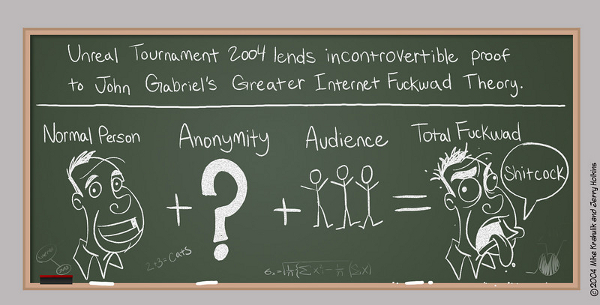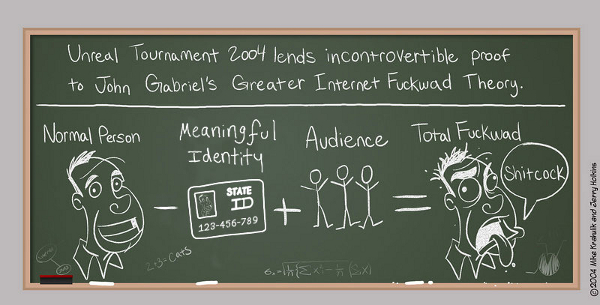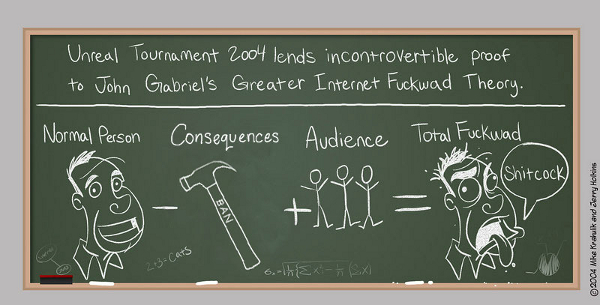Anonymity Vs. Consequences
2012-11-06Earlier this year, while running through my usual patrol duties of online harassment discussions, I began to notice a conversational pattern. Usually there are several similar branches of conversation within this topic, particularly visually apparent in actual indented threads. (ex: reddit) I noticed that one branch of the discussion often seemed to be trimmed in the same place. Right around here:

Thus, taking a cue from Godwin's Law:
As a discussion about online harassment and bullying grows longer, the probability of a commenter linking to John Gabriel's Greater Internet Fuckwad Theory approaches 1.
Of course, this version doesn't preclude Godwin's Law within the discussion itself. But one other similarity between linking the GIFT comic law and Godwin's Law is part of one of the latter's established corollaries: once Godwin's Law has been fulfilled, the discussion is finished. Or at least, that branch of it.
The GIFT is used as a convenient explanation for why online harassment and general jackassery occurs. It's short, to the point, and has implanted itself firmly in the larger gamer consciousness. Everyone knows it, and it's even referenced in non-gamer trolling conversations. But the conversational pattern I observed was that after the GIFT was referenced... nothing. No more responses. No more leaves on that branch of discussion. That's it, we've identified the cause, wrapped up neatly in an equation format. So you know, what ya gonna do. Shrug.
But why? Why is there nothing else to say? Isn't there some way to use this equational-framework to tackle this? I started thinking about the ways one can break the equation to combat or prevent fuckwadification. If you remove one of the elements, then do fuckwads not manifest?
Attempts have certainly been made using this way of thinking. Blizzard is known for attempting to combat the rampant trolling on their forums by announcing Real ID back in 2010, to huge customer backlash. Just three days after announcing that full first and last names would be required to post on their forums, Blizzard backed down and did not implement that full-name-required version of Real ID. Importantly, this removal of Anonymity was originally intended to specifically cut down on fuckwads. It's important to note that this was a tactic that Blizzard specifically intended to prevent trolling, or in other words, the fulfillment of the Greater Internet Fuckwad Theory. Of course, compromising the safety of the people who were already being stalked and cyberbullied by revealing their full names was too high of a price to pay. Blizzard eventually released a different version of Real ID that did not require all users to reveal their full names. In fact, the Real ID page highlights the preservation of Anonymity via maintaining an online handle.
Blizzard's original intention reflects the most common definition of Anonymity as being a Lack of Meaningful Identity. So, rearranging the GIFT equation to reflect this definition, we get:

It seems obvious, right? Breaking this equation seems even clearer, now. “Remove Anonymity," or in other words, “Add Meaningful Identity," and theoretically the fuckwad never appears. But when thinking about those trimmed conversational branches, I started to wonder if it was the colloquial definition of Anonymity was holding us back from continuing those discussions in a productive way.
Influenced by some work-related theory readings, I thought about how systems handle Identity and what it means to have a unique user representation within one. (There's a whole other Computer Science thing around Identity that's too big for this, but it's just what got me thinking.) What does it mean to be a user on a game, console, forum, online service? How is a person represented on Xbox Live? Well, they have an account, a user-chosen avatar and thumbnail picture, a user-chosen Gamertag, a friends list, reports against them from other players, punitive-action history, gaming achievements, etc.
Okay, so that's what a system knows about a person using it. But, well... that's not a person. Obviously. It's an account, which is a collection of some specific pieces of data about a person and their relationship to the system itself. And yet, notice what's still missing when you conceptually separate an account's data points from a person: Meaningful Identity. It's not required as part of retaining a unique account.
And of course, uniqueness is a requirement on Xbox Live. If you know someone's Gamertag, then you know how to find their account. Most people would agree that a person remains Anonymous when they send hatemail over Xbox Live; there is no Meaningful Identity associated with that person. The person may have chosen that avatar and Gamertag, but it's nowhere near the same thing as Blizzard's initial Real ID full-name solution.
Back to breaking the GIFT equation: we already know that removing everybody's mask of online handles is too high a price to pay. But in a technical context, a computer system doesn't care about a person's real name and thus exposing them isn't really necessary when enacting consequences on an account. In fact, let's see how Consequences fits into the equation:
The Greater Internet Fuckwad Theory v2.0

The best way to break the GIFT equation and continue these branches of discussion is to equate Anonymity with a Lack of Consequences. This revised equation reflects that. Games are software systems, and user accounts both contain and generate data on these systems. This data is then available for analysis and use to create better environments online and thus reduce the level of fuckwadification. This is essentially what's being argued in the Extra Credits episode on tackling harassment via technical means. Recognizing that a user's privacy/identity can be preserved while still taking punitive action against an account is one of those breakthroughs that allows us to leap forward in our problem-solving.
What's weird about these trimmed conversation branches is that gamers are used to account consequences in other technical contexts, such as on discussion forums. Everyone has heard of suspensions, probations, bans, temp bans, hell bans, perma bans, etc. It's normal. Yet there seems to be something about the GIFT in particular that stops commenters from discussing the use of these regularly-used tools in a video game context. When a discussion branch about the hopeless and insurmountable inevitability fulfills the GIFT comic posting law, it's usually happening in an online forum where punitive consequences against user accounts is a regular occurrence. The cognitive dissonance is astounding, but I attribute this pattern to the rhetorical power of the GIFT equation itself. It somehow carries a sense of finality and authority, and the ambiguous definition of Anonymity has led to much confusion on how to work at solving the harassment problem.
Back in the summer, I was lucky enough to be on two panels discussing harassment and bullying in gaming. At Geek Girl Con it was “Go Make Me A Sandwich": Barriers to Women's Participation in Online and Fan Spaces, and at PAX Prime it was Harassment and Bullying in Online Games: Technical Solutions v1.0. The video for that PAX panel is online, yay! More recently, I was invited to speak at Digipen for the Diversity in Games & Entertainment student group. And of course I actually attended GGC and PAX Dev/Prime, which all had additional content specifically focused on harassment. These events included discussions of Anonymity, but not always in the same way.
Several times I witnessed the same gamer-ingrained Lack of Meaningful Identity definition of Anonymity seep into discussions at these events. More than once, the same people who had insightfully discussed the necessity of Consequences oscillated back to Lack of Meaningful Identity later on. It was strange to watch these leaps, because it seems that sometimes the discourse does, in fact, mention Consequences. Yet I get the impression that many people still seem to think that Consequences only arise when Identity is established, but with no clear indication of how the two are connected.
Moreover, there was no critical evaluation of the actual necessity of exposing Meaningful Identity at these events. As established earlier, I maintain that the two concepts are separate and Consequences do not, and should not, require that breach of privacy. We're still stuck in the same place Blizzard was when it first announced its plans for Real ID. (More recently, even Youtube pushed users into using their real names before commenting.) I listened to a discussion of how things like Facebook Connect for comment threads are a way to largely eliminate Anonymity (by that they meant exposing Meaningful Identity), but then it veered off into anecdotes about how policing Facebook pages from hate speech is still necessary. In other words, adding Meaningful Identity isn't even working, thus they are forced to add Consequences. The two concepts are entirely separate and are not dependent upon one another! Knowing someone's real name doesn't stop them from bullying another person, whose real name is also know. Sigh. The Facebook Disconnect, I suppose.
I've been trying to keep up with the larger public discourse about harassment in gaming because I see a bright future ahead and I genuinely want everyone to come along for the ride. I've witnessed so much despair, pessimism and hopelessness out there when discussing the harassment problem. So many people believe that you can't combat the fuckwads because you can't sacrifice the 'standard' Identity-based definition of Anonymity, so why even talk about it? It's too depressing for them to dwell on. Cue their muscle-memory hitting that mute button without hesitation.
I saturate myself in these discussions, events included, partly because I want to see if there are any new ideas or perspectives out there, and there are some! And also there are little pockets of hope, of which I am one. I'm really excited by Riot's dedication and ingenuity to their social systems in League of Legends. ArenaNet's Guild Wars 2 launch has been fascinating to watch, as they made the bold move to strictly enforce their policies right from the start, establishing a community standard rather than trying to fix it later. Recently, 343 Industries has publicly come out against the negative online culture. I'm very curious to watch how well this is implemented above-and-beyond the XBL Enforcement already in place. We don't have any details yet, but I'm cautiously optimistic that they've put some time and effort into this. Halo 4 releases today. Let's see what you got, 343!
But no matter the game or company, even if it takes some time to get it right, it's an endeavour worth pursuing. Riot has been working on their social systems for years and they've only grown more sophisticated and their latest results are very positive. With companies framing this problem as an issue that software can assist with, we might now be seeing a manifestation of the Lack of Consequences version of Anonymity -- even if everybody still thinks about it in terms of Lack of Meaningful Identity. Though we may never get to the point where people consciously make that distinction and still engage in some tangled conversations about Anonymity, we're getting closer to letting those branches grow and bear fruit regardless.
Special thanks to ERRRSkate151 for his assistance with the GIFT images above.
